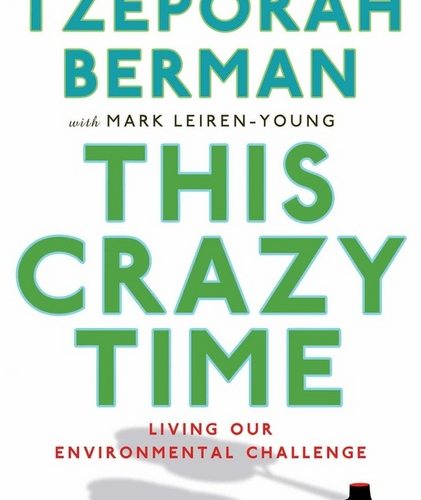When reviewing a book, I mark it up mercilessly. I jot down notable points, create a list of possible quotes and scribble down potential themes that might shape my review. When my lists are long, jumbled and written in my fast, furious – and almost illegible – handwriting, it means that the book has either raised my hackles or inspired me.
When reviewing a book, I mark it up mercilessly. I jot down notable points, create a list of possible quotes and scribble down potential themes that might shape my review. When my lists are long, jumbled and written in my fast, furious – and almost illegible – handwriting, it means that the book has either raised my hackles or inspired me.
This Crazy Time by Canadian environmental activist Tzeporah Berman falls in the latter category. For the most part, it is a rip-roaring tale that gets behind the scenes of some of Canada’s best known environmental campaigns, ranging from the Clayoquot Sound protests on Vancouver Island in the 1990s to protecting the Great Bear Rainforest in BC and the Boreal forest in Ontario.
Berman writes about her first-hand experience on the front lines and in the back rooms of environmental organizations, concluding, “In the end it is about creativity, commitment, courage and a little bit of luck or magic.” I would add moxie to that list.
For instance, the campaign that succeeded in having lingerie behemoth Victoria’s Secret change its paper-buying policies was gobsmackingly good. To quote Berman, it was also “a critical piece of the puzzle that led to the Canadian Boreal Forest Agreement,” which involves 21 forest companies, nine environmental organizations and 21 million hectares of public forest.
Coming up with a spoof ad that featured a corset-and-garter-belt-clad blonde slinging a chainsaw between her legs, and labelling it “Victoria’s Dirty Secret” was undoubtedly creative. But to spend $30,000, half of ForestEthics’ campaign budget, to take out a full-page ad in The New York Times, takes moxie. Berman explains that at first, the venerable newspaper refused to print the ad, claiming that it was too suggestive. They gave in when ForestEthics pointed out that the paper didn’t have trouble selling advertising space to Victoria’s Secret.
The chainsaw ad went viral. Papers including USA Today picked up the story. By some estimates, ForestEthics received the equivalent of $1.5-million in free media coverage for its $30,000 investment.
The beauty of the Victoria’s Secret campaign is that the spoof ad was only part of what ForestEthics did. “We followed the ad with serious grassroots organizing around the United States,” she writes. No kidding. They staged 852 protests outside Victoria’s Secret stores, and held a rally during the company’s annual fashion show in New York. They also sent the Victoria’s Secret CEO more than 10,000 letters and a postcard bearing his photo with a devil on one shoulder and an angel on the other, with the cutline, “You can make all the difference. Protect our forests.”
Six months later, Berman was meeting with the company at its invitation. Eventually, Victoria’s Secret agreed that it would no longer buy paper from any company that logged endangered forests or endangered caribou habitat in the Boreal forest. If that doesn’t impress you, consider that Victoria’s Secret produces one million catalogues a day.
It is hard not to review Berman’s actions rather than what she, with the help of accomplished writer Mark Leiren-Young, put in print. Most of the time, I was in awe of what this relatively young woman has done. (She’s 43.) Sometimes she comes across as being pretty full of herself – she actually describes how her colleagues took her down a notch when she got too big for her britches – but she manages to write about her numerous brushes with stars and stardom without making me bristle (not too much). At some length, Berman describes her meetings with Leonardo DiCaprio, Paris Hilton, Van Jones, Tobey Maguire, Val Kilmer and more. One minute she’s sharing a dressing room with Desmond Tutu, the next she’s lunching with Irmelin DiCaprio (the actor’s mother) and then she’s being dressed by LA’s hottest designers. What surprised me most after reading about all of her exploits is that Tzeporah Berman is not more of a household name in Canada.
Berman wowed me with her descriptions of the sophistication behind the organizations that she worked with – mostly Greenpeace and ForestEthics. She was renting float planes here, commissioning someone to manufacture an enormous inflatable spirit bear there, hiring top consultants and chartering sailboats with never a mention of the funding problems that plague environmental groups. I’m certain making these high-priced decisions wasn’t as easy as Berman lets on, but not reading about chronic underfunding was refreshing and likely contributed to the book’s readability.
This Crazy Time, however, is not all flash and sizzle. Embedded within these highly entertaining stories are Berman’s observations, her lessons learned, and her constant search for meaning in her own environment-saving work. She writes, “I’ve spent my adult life working on environmental issues, and it took me six months of intensive research to even begin to figure out what I was for.” She repeats what seems to be the latest evolution in environmental messaging: “We need to talk about the dream,” adding, “travel agents don’t talk about the cost or the flight to Hawaii; they talk about the beach.”
My only complaint is Berman’s failure to follow her own lesson. In the chapter on her current climate change efforts, she adopts a Suzuki-esque tone of doom and gloom. She drags down the let’s-get-’em rhythm by describing the dire nature of our current situation. It borders on sounding preachy, but maybe that is just her age showing through. Maybe the passionate and invincible fire-in-her-belly 20-year-old has matured. She now runs the climate change program for Greenpeace in Amsterdam. Berman describes her new employer: “In Amsterdam the upraised marble reception area of the Greenpeace office had three receptionists seated at a high, high desk with their little headphones on, all saying, ‘Good afternoon, Greenpeace. Could you hold, please’ in at least three different languages.”
That image of Greenpeace bears little resemblance to the Vancouver organization of the 1970s. Then, Greenpeace’s office was likely in the rusty, damp cockpit of the Rainbow Warrior, and the radical organization’s founders were likely more familiar with handcuffs than strategic plans.
Similarly, in the last pages of the book, Berman’s rollicking tales of audacious tactics give way to descriptions of more sober and determined campaigns. They don’t make great copy, but perhaps they are what we need as the environmental movement shifts from simply trying to get coverage on the six o’clock news to actually bringing about the policy changes required to realize a more sustainable world. More likely, however, we need both.
This Crazy Time, Tzeporah Berman, Toronto: Knopf Canada, 2011, 384 pages
This review originally appeared in Art & Media, Issue 38.3. Subscribe now to get more book reviews in your mailbox!
Reviewer Information
Nicola Ross is the former Editor of Alternatives Journal, and is a member of the editorial board.













